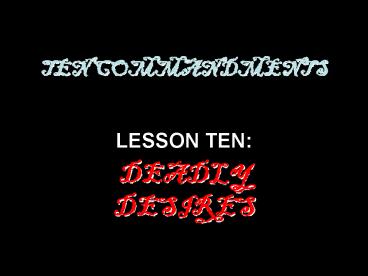TEN COMMANDMENTS - PowerPoint PPT Presentation
1 / 19
Title:
TEN COMMANDMENTS
Description:
'Thou shalt not covet thy neighbor's house, thou shalt not covet thy neighbor's ... The Apostle was a Pharisee and a teacher of the law of Israel. ... – PowerPoint PPT presentation
Number of Views:55
Avg rating:3.0/5.0
Title: TEN COMMANDMENTS
1
TEN COMMANDMENTS
- LESSON TEN
- DEADLY DESIRES
2
EXODUS 2017
- Thou shalt not covet thy neighbor's house, thou
shalt not covet thy neighbor's wife, nor his
manservant, nor his maidservant, nor his ox, nor
his ass, nor any thing that is thy neighbor's.
3
- The last six commandments deal with human
relationships. - This commandment is the only one of the last six
that is not written into the laws of any society.
- You can't legislate the heart.
- However, this is the very commandment God used to
convict, and eventually convert Paul.
4
- The Apostle was a Pharisee and a teacher of the
law of Israel. - But in Romans 7 Paul says that sin "wrought in me
all manner of covetousness." - He obeyed the law externally but found himself
guilty before God because of his heart of
covetousness.
5
- 1. What does "coveting" mean?
6
- Covetousness simply means -- "a strong desire."
- There is nothing wrong with having strong
desires. - We all desire to eat, sleep, etc.
7
- Spiritually, Peter says we are to "desire the
sincere milk of the Word." - Paul said to "desire the best gifts," and Jesus
said, "desire righteousness of God." - A two-fold biblical definition of "coveting"
would be
8
a. To strongly desire something possessed by
another
- "Thou shalt not covet . . . anything that is thy
neighbors" (Exodus 2017). - King Ahab in 1 Kings 21 is a prime example of the
dangers of covetousness.
9
b. To strongly desire something prohibited by God.
- When Jericho was destroyed God told Israel not to
take anything. - But Achan "coveted" (Joshua 721) some gold,
silver, and a Babylonian garment. - He took them and as a result Israel was judged by
God at the battle of Ai. - Wanting or desiring is essential to physical and
spiritual life, but it can become an evil thing.
10
- 2. How is "coveting" manifested?
11
a. Envy
- An inability to be happy for the success of
others. - Envy is the mother of covetousness and "envy is
the rottenness of the bones" (Proverbs 1430).
12
b. Complaining
- Murmuring about one's circumstances.
- "Let your conversation be without covetousness
and be content with such things as ye have"
(Hebrews 85).
13
c. Greed
- Grasping for more riches with no thought of
giving. - John Gill said, "A covetous man is like a small
creature with no passage through. - It takes in all it can but lets out nothing.
- The covetous man and this creature burst with
their own fullness."
14
d. A general discontentment with life
- an inability to learn satisfaction in God.
15
- 3. How is "coveting" managed?
16
- Since coveting is a sin of the heart, the only
way it is managed is for there to be surgery upon
the heart by the Great Physician. - In essence, Jesus Christ can make a person
content in this life, regardless of his
circumstances. - But if you find yourself as a Christian fighting
the sin of covetousness, there are two things
that might help.
17
a. Remember you are but a transient in this world
.
- An understanding of your own mortality will
always help you keep in focus what is important
in life.
18
b. Rejoice in God's eternal love for you.
- The Apostle Paul describes the love of God for
His people in Ephesians 317-19. - He then prays that we might "know" this love and
when we do, we will be "filled with all the
fullness of God" (v.19).
19
(No Transcript)































